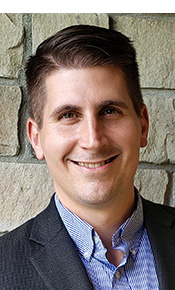By Chris Moon
Sometimes, a vision doesn’t immediately come to fruition. It can take years to develop.

Such has been the case for Jamin Bailey.
Sixteen years ago, while he was a preaching student at Johnson University in Knoxville, Tenn., he visited his brother at a military base. While there, he saw a couple of Marines getting “dressed down” by a sergeant for being in the wrong place at the wrong time.
“In the midst of this uproar came a chaplain,” Bailey told Christian Standard. “I do not know who he was or how he knew to be there that night. He took the two Marines aside, and they stood together in an open field. I watched him calmly speaking with the two Marines, listening, and communicating to everyone present his genuine care and concern for them.”
It was the kind of “life-on-life” ministry Bailey knew he wanted to pursue. His course was set.
“It was that quick,” he said. “I saw that guy, and that was it. This was what I wanted to do.”
Bailey has been on a journey toward military chaplaincy, with its starts and detours, ever since.
In August, he will take 16 years’ worth of ministry training, military experience, and corporate chaplaincy work into the U.S. Navy, where he will serve as a chaplain on a guided missile cruiser out of Norfolk, Va.
“Sixteen years later, it’s finally happening,” he said.
But Bailey says nothing that has happened in the intervening years has been wasted.
“It’s been God preparing me,” he said.
A MARINE
Bailey has been following God one step at a time.
In high school, at the encouragement of his youth pastor, Bailey competed in a preaching competition at a youth conference. (He won.) His calling to ministry came to him shortly afterward, and he attended Johnson University, where he decided he wanted to become a military chaplain.
But after graduating from Johnson, Bailey enlisted in the Marines.
He knew he needed to gain straight-up military experience before he could serve effectively as a chaplain. A chaplain needs credibility, and that comes only with serving.
“It’s like when a young preacher comes into a church,” Bailey said. “There are just things that are hard to do. It’s hard to counsel. It’s hard to be perceived as having authority because you are so young.”
Bailey ended up serving six years as an engineer in the Marines, both in the South Pacific and in the Middle East. He built schools and airfields, often in a humanitarian capacity.
He said he did flirt with the idea of simply remaining a Marine. However, “the burning desire to be just focused on people didn’t go away.”
CORPORATE CHAPLAINCY
So Bailey left the Marines and attended The Southern Baptist Theological Seminary in Louisville—still with his eye on becoming a military chaplain.
But while there, he heard about a different kind of chaplaincy that would put him in regular contact with people and their needs. Bailey signed on with Corporate Chaplains of America, which is devoted to meeting needs—and sharing the gospel—among the everyday workforce across the country.
For the next seven years, Bailey served a variety of companies as a corporate chaplain, eventually becoming a regional director with CCA.
Private companies increasingly are turning to corporate chaplaincy as a benefit to their employees.
“In some industries, turnover is their number-one cost,” Bailey said.
But turnover can be reduced as employees’ needs are met not only through financial compensation, but also through personal and spiritual support. So companies hire CCA to provide chaplains to their employees.
A corporate chaplain with CCA tries to spend time with every employee—as many as 800 of them across several companies—each week. The idea is to build relationships with those employees in hopes of gaining permission to share the gospel with them.
Bailey said 10 percent of employees typically welcome their interactions with chaplains. Another 80 percent are ambivalent, while 10 percent are resistant. But over months and years, a chaplain can gain a hearing with even those who at first want nothing to do with a chaplain.
Going from “forklift to forklift, truck to truck, cubicle to cubicle,” Bailey said, chaplains steadily build rapport with employees and can check in with them about things going on in their personal lives.
“It’s amazing what develops over that time,” Bailey said.
Bailey recounts how a driver at a trucking company was rather resistant to a chaplain for two years—until the employee was diagnosed with cancer. After learning his condition, the driver first called his wife to tell her the news. Then he called the chaplain.
A friendship developed between the driver and the chaplain as the two walked through the cancer treatments together. The driver eventually accepted Christ.
“We can go where pastors can’t,” Bailey said of corporate chaplains.
Bailey oversees 27 chaplains, mostly in Indiana, Ohio, and Kentucky. Corporate Chaplains of America has chaplains in 43 states, and the demand continues to grow.
And Bailey is growing, too. He’s preparing to start officer development school next month with the U.S. Navy—a dream 16 years in the making.
“I’m excited to see the next chapter,” he said.
Chris Moon is a pastor and writer living in Redstone, Colorado.
_ _ _
Information about serving as a chaplain is also available at the Chaplaincy Endorsement Commission website, www.cec-chap.org. The CEC is an agency of the Christian churches and churches of Christ.

0 Comments